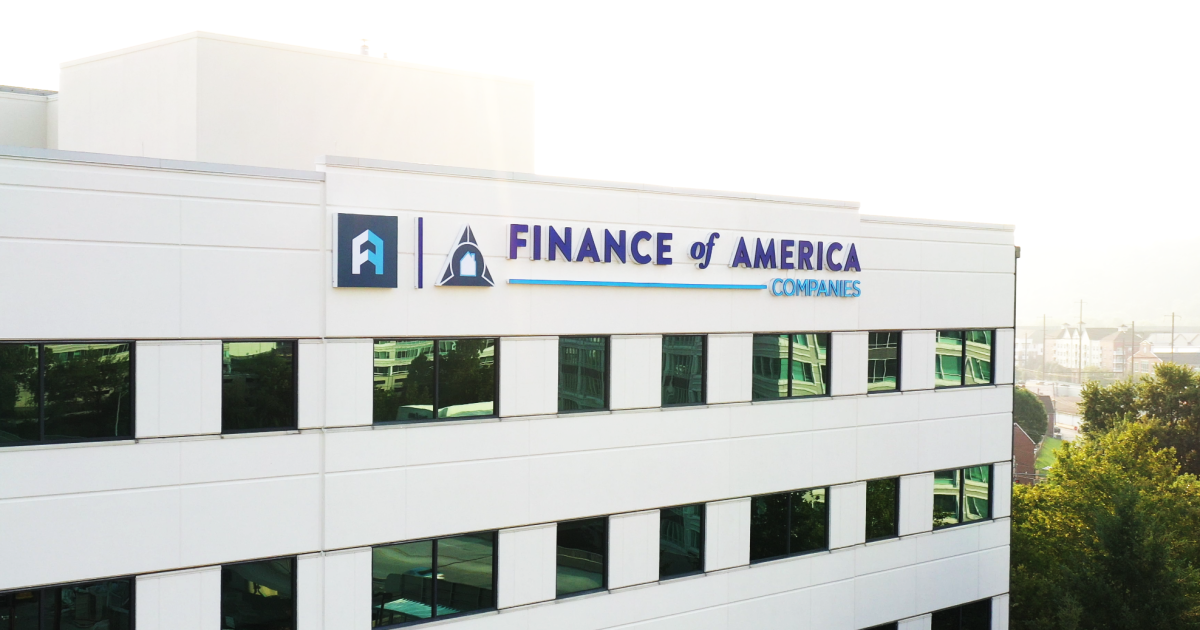Top reverse-mortgage lender Finance of America reported an unaudited quarterly reduction in its net loss during its earnings call Tuesday, initially giving a slight lift to its shares, which have been trading in penny stock territory.
The company recorded a net loss of $175 million in the third quarter, $172 million of which was from continuing operations. It took losses of $222 million in the second quarter, and $302 million in the third fiscal period of last year when it shut down its traditional mortgage unit to reposition.
As the leading player in a specialized niche within the consolidating mortgage market, Finance of America’s ability to reduce its losses and return to profitability are being watched closely.
The success of their efforts may hinge in part on market conditions that have impacted the valuations it must record on its assets and relatively higher rates that have challenged originations.
“Overall, this [was] another busy quarter with several macro headwinds beyond our control, but we remain focused on ensuring our long-term success,” CEO Graham Fleming said during the company’s earnings call.
The company increased reverse mortgage originations during the quarter, generating $512 million in funded loan volume, up from $447 million in the second quarter. This brought its market share to 37%.
However, due to a drop in margins to 7.8% from 9.2%, its revenue was flat, said Michael Fant, senior vice president of finance.
“If margins had held constant in the second quarter, our growth in volume would have equated to an $8 million increase,” he said.
The reverse market is dominated by Federal Housing Administration-backed Home Equity Conversion Mortgages, which people 62 and up can use as a retirement strategy, so the company’s ability to profit is a concern for public agencies in addition to private investors.
Finance of America also is leaning into offering private reverse products that include a second mortgage for borrowers 55 and up. That product is designed to address the relative rise in rates that has deterred borrowers with existing, lower-cost first mortgages from refinancing.
“The broader market dynamics have created an increased appeal of our HomeSafe Second-lien product,” President Kristen Seiffert said during the earnings call.
Finance of America will be marketing the product through the origination system that most mortgage brokers that do business with the company use. It also will be rolling the product out to the full sales team in American Advisors Group’s call center this month.
AAG was the leading reverse mortgage company prior to Finance of America acquiring it. FOA also recently named Matt Engel, the American Advisors Group’s former chief financial officer, to succeed Johann Gericke, who resigned from FOA. Gericke is now the CFO at Aqua Finance.
Engel will start as chief financial officer at Finance of America on Nov. 14, Fleming said during the earnings call. Graham has been serving as interim CFO.
The new CFO’s ability to manage balance sheet health in addition to generating new revenue and managing losses will be watched closely by investors and rating agency analysts.
That’s because both financial indicators factor into the company’s ability to borrow from commercial lenders, who have already provided some waivers for certain covenant breaches.
These lenders have shown some wariness of broader developments in the reverse market.
They’re closely monitoring a lawsuit filed over another sizable reverse mortgage company’s bankruptcy last year. In that litigation, warehouse lender Texas Capital Bank challenged government agency Ginnie Mae’s decision to cancel collateral liens, according to Bloomberg.
There are also broader public concerns around the context of that lawsuit involving an inquiry into how Ginnie Mae handled the bankruptcy of Reverse Mortgage Funding. Ginnie Mae guarantees securitizations of FHA and other government-backed loans.
Balance sheet numbers at FOA show proceeds from transactions and actions the company took to reduce leverage increased its cash and equivalents by 18% on a consecutive-quarter basis to $66 million. Securitized loans held for investment rose 1% to nearly $25.1 billion.
Total assets fell 1% to $26.4 billion due to discontinued operations. Liabilities were largely unchanged at nearly $26.3 billion, rising a negligible amount. Total equity fell 62% to $104 million.
In addition to sharing information about the company’s financials, executives participating in the company’s earnings call mourned the loss of former CEO Patti Cook, who died last week.
“Patti was an extraordinary leader of Finance of America, but more importantly, she was a wonderful woman and friend,” Fleming said.
